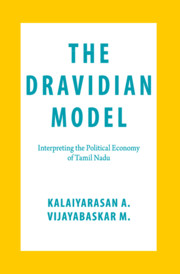Book contents
- Frontmatter
- Dedication
- Contents
- List of Tables
- List of Figures
- List of Abbreviations
- Acknowledgements
- 1 The Dravidian Model: An Introduction
- 2 Conceptualising Power in Caste Society
- 3 Democratising Education
- 4 Democratising Care
- 5 Broadening Growth and Democratising Capital
- 6 Transforming Rural Relations
- 7 Popular Interventions and Urban Labour
- 8 Fissures, Limits and Possible Futures
- Bibliography
- Index
5 - Broadening Growth and Democratising Capital
Published online by Cambridge University Press: 08 July 2021
- Frontmatter
- Dedication
- Contents
- List of Tables
- List of Figures
- List of Abbreviations
- Acknowledgements
- 1 The Dravidian Model: An Introduction
- 2 Conceptualising Power in Caste Society
- 3 Democratising Education
- 4 Democratising Care
- 5 Broadening Growth and Democratising Capital
- 6 Transforming Rural Relations
- 7 Popular Interventions and Urban Labour
- 8 Fissures, Limits and Possible Futures
- Bibliography
- Index
Summary
If social justice, as the Dravidianists imagined, was rooted in a process of inclusive modernisation, what does it mean for the process of capital accumulation? There are two interpretations of the unfolding of the process of accumulation in the state. According to one, both Dravidian parties have focused on welfare politics, leaving the elites to dominate the realm of capital accumulation (Harriss and Wyatt 2019). Harriss (2003) in fact observes that the prominent business leaders have continued to remain at the top for decades. Harish Damodaran (2008), though not exactly contesting this position, argues that there has been a ‘democratization of capital’ in southern India including Tamil Nadu, due to certain historical factors. Drawing upon works by historians like Mahadevan (1992, 2017), Damodaran argues that the absence of a dominant trading community (Vaishya) in the south allowed for entrepreneurs from lower castes to emerge, bringing about a process of ‘democratisation of capital’. He thus attributes this ‘democratisation’ to a combination of opportunities opened up by colonial commerce and the ability of specific lower castes rooted in particular geographies to take advantage of these opportunities. In other words, this process has happened independent of any deliberate policy interventions. On a similar note, while Swaminathan (1994) suggests a relative absence of entrepreneurship in the state, Sinha (2005) argues that there has been inadequate state support for industrialisation. Partly contesting these propositions, in this chapter we make a case for the role of state intervention backed by a political imagination in facilitating and ‘democratising’ capital accumulation in Tamil Nadu.
According to ideologues of the Dravidian movement, there were two factors that hindered democratising capital accumulation in the region. First, they held that the caste system rendered actors from some castes ‘born capitalists’ and those from others ‘born labourers’ (Vidiyal 2017: pp. 737–38). Addressing railway workers in 1952, Periyar called upon the workers to understand that it was being born into a specific caste that made them a part of the working class while members of the upper castes become capitalists by virtue of their birth. Their struggle should therefore be to destroy the institution that generates and sustains this class divide. Second, the dominance of Marwari (‘north Indian’) capital in the country and in the region was seen to prevent modernisation of the economy and entry of ‘Tamils’ into business (Annadurai 2017 [1949]).
- Type
- Chapter
- Information
- The Dravidian ModelInterpreting the Political Economy of Tamil Nadu, pp. 112 - 143Publisher: Cambridge University PressPrint publication year: 2021



